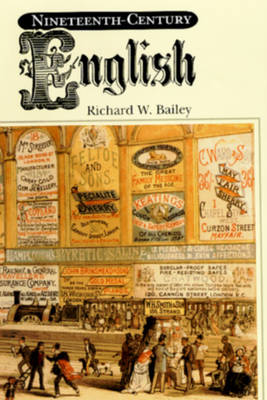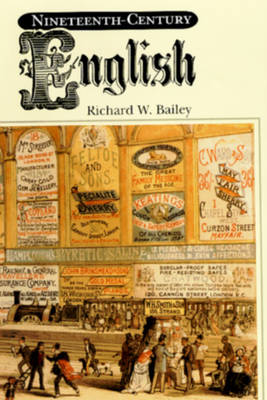
- Retrait gratuit dans votre magasin Club
- 7.000.000 titres dans notre catalogue
- Payer en toute sécurité
- Toujours un magasin près de chez vous
- Retrait gratuit dans votre magasin Club
- 7.000.0000 titres dans notre catalogue
- Payer en toute sécurité
- Toujours un magasin près de chez vous
Description
Jane Austen's English is far different from Virginia Woolf's, but historians of the English language have given scant attention to the ways in which English changed over the course of the nineteenth century. In Nineteenth-Century English, Richard W. Bailey treads new ground by showing the extent to which the language changed as cultural and economic transformations brought us into the modern world.
Six aspects of nineteenth-century English are treated in separate chapters: writing, sounds, words, slang, grammar, and "voices." In each domain, innovation and obsolescence are discussed as they were observed by contemporary writers. Thus Bailey shows how linguistic details gained powerful social meaning in the emergent stratification by class, region, race, and gender of the anglophone community.
At the beginning of the century, the "Italian" sound of a in dance was thought to be an intolerable vulgarity; by the end, it was a sign of the highest refinement. At the beginning, OK had yet to be invented; by the end, it was being used in nearly all varieties of English and had appeared as a loanword in many languages touched by English. At the beginning, mixed forms of English--pidgins and creoles--were little known and thoroughly despised; by the end some of them had become vehicles for Bible translation. As English became a global language, it took on the local color of its surroundings, and proper usage became ever more important as an index of social worth, as a measure of intelligence, and as a gauge to a person's suitability for employment, often resulting in painful consequences. What the language was like changed dramatically. What people thought about the language changed even more.
"The tale that Bailey has to tell . . . is little short of enthralling. Drawing on previously neglected material--novels, magazines, letters and diaries--he shows how the language came into the century a Georgian popinjay and left it a sober-suited man of business, purged of quirks and flashy curiosities. Along the way, Bailey uncovers a language which, while it seems familiar enough on the printed page of a Jane Austen novel, was actually quite different from the English we use today. . . ." --Robert McCrum, Observer (London)
Language changes as time goes by. Modern listeners can barely comprehend Old and Middle English. Although we are able to understand nineteenth-century English, the language changed with the effects of industrialization, urbanization, bilingualism, and growing literacy. In this book, Richard Bailey uses numerous examples and illustrations to demonstrate the changes in English. Furthermore, he identifies the connections between social events and linguistic transformation.
". . . a highly engaging study of a broad and difficult subject. Bailey is an excellent writer--the chapters are well-organized and written in a vigorous style that is buoyed by a wry sense of humor. . . ." --Lexicographia
". . . entertaining, lucid, packed with detail, and refreshingly alert to the arresting quotation. If it is unusual to associate pleasurable reading with the scholarly analysis of language, Bailey also makes clear the serious philological and political implications of his study." -- Times Literary Supplement
Richard Bailey is Professor of English, University of Michigan, and is known internationally as an expert on social and regional varieties of English.
Six aspects of nineteenth-century English are treated in separate chapters: writing, sounds, words, slang, grammar, and "voices." In each domain, innovation and obsolescence are discussed as they were observed by contemporary writers. Thus Bailey shows how linguistic details gained powerful social meaning in the emergent stratification by class, region, race, and gender of the anglophone community.
At the beginning of the century, the "Italian" sound of a in dance was thought to be an intolerable vulgarity; by the end, it was a sign of the highest refinement. At the beginning, OK had yet to be invented; by the end, it was being used in nearly all varieties of English and had appeared as a loanword in many languages touched by English. At the beginning, mixed forms of English--pidgins and creoles--were little known and thoroughly despised; by the end some of them had become vehicles for Bible translation. As English became a global language, it took on the local color of its surroundings, and proper usage became ever more important as an index of social worth, as a measure of intelligence, and as a gauge to a person's suitability for employment, often resulting in painful consequences. What the language was like changed dramatically. What people thought about the language changed even more.
"The tale that Bailey has to tell . . . is little short of enthralling. Drawing on previously neglected material--novels, magazines, letters and diaries--he shows how the language came into the century a Georgian popinjay and left it a sober-suited man of business, purged of quirks and flashy curiosities. Along the way, Bailey uncovers a language which, while it seems familiar enough on the printed page of a Jane Austen novel, was actually quite different from the English we use today. . . ." --Robert McCrum, Observer (London)
Language changes as time goes by. Modern listeners can barely comprehend Old and Middle English. Although we are able to understand nineteenth-century English, the language changed with the effects of industrialization, urbanization, bilingualism, and growing literacy. In this book, Richard Bailey uses numerous examples and illustrations to demonstrate the changes in English. Furthermore, he identifies the connections between social events and linguistic transformation.
". . . a highly engaging study of a broad and difficult subject. Bailey is an excellent writer--the chapters are well-organized and written in a vigorous style that is buoyed by a wry sense of humor. . . ." --Lexicographia
". . . entertaining, lucid, packed with detail, and refreshingly alert to the arresting quotation. If it is unusual to associate pleasurable reading with the scholarly analysis of language, Bailey also makes clear the serious philological and political implications of his study." -- Times Literary Supplement
Richard Bailey is Professor of English, University of Michigan, and is known internationally as an expert on social and regional varieties of English.
Spécifications
Parties prenantes
- Auteur(s) :
- Editeur:
Contenu
- Nombre de pages :
- 386
- Langue:
- Anglais
Caractéristiques
- EAN:
- 9780472085408
- Date de parution :
- 21-07-98
- Format:
- Livre broché
- Format numérique:
- Trade paperback (VS)
- Dimensions :
- 153 mm x 229 mm
- Poids :
- 526 g

Les avis
Nous publions uniquement les avis qui respectent les conditions requises. Consultez nos conditions pour les avis.






